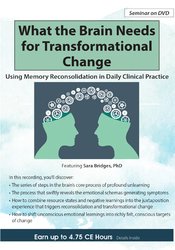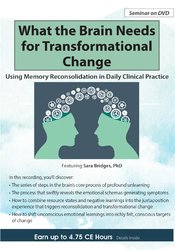What You’ll Discover in Bruce Ecker, Sara Bridges What the Brain Needs for Transformational Change Using Memory Reconsolidation in Daily Clinical Practice
- Faculty:
- Bruce Ecker | Sara Bridges
- Duration:
- 4 Hours 3 Minutes
- Format:
- Audio and video
- Copyright:
- Mar 24, 2017
Description
Neuroscientific advances in With memory consolidation, we can achieve breakthroughs in therapeutics that are previously impossible to achieve. In this workshop, you’ll learn how to engage the Neuronal process that removes implicit learnings that are responsible for compulsive behaviors and PTSD. You’ll see how reconsolidation underlies the It is crucial to transformal change by demonstrating the effectiveness of many therapies. You can mobilize with videos and live demonstrations. the brain’s power to unlock and dissolve long-Embedded schemas, ego states and emotional conditionings. You’ll discover:
- The sequence of steps in the brain’s core process of profound unlearning
- It is a process that quickly reveals the emotional schemas generating symptoms
- How to combine resources and negative learnings into the The juxtaposition experience triggers transformational change and reconsolidation
- How to transform unconscious emotional learnings into conscious, richly felt targets for change
**This recording is intended only for Mental health professionals and mental health trainees.
Handouts
| ZNM052875 (2.60 MB) | 16 Pages | Available after Purchase |
Outline
- There are many types of memory consolidation and change:
Counteractive
Transformational
- Transformational Change therapies
Common therapeutic factors across diverse approaches
Permanence of transformational change
- Memory Reconsolidation and deconsolidation
History and research
- Emotional Learning
Nonverbal, implicit structure
Schemas and their self-Protective function
- New learning can have a significant impact
Brain Circuits involved
Challenges of incremental learning and change
- Schema and implicit memories erasure
Non-Reactivation
Symptom cessation
Effortless permanence
- Change Mechanisms and sequences for therapeutic approaches
- Process for schema erasure
Reactivation
Guided contradictory experience
Juxtaposition with target schema
- Preparation for Intervention
Symptom identification
Retrieving underlying schema
Finding contradictory experiences
- Common, non-specific therapeutic factors
- Validating therapeutic outcomes
Dissolution of schema
Evaluating presence of multiple schemas
- Clinical Examples of transformational processes in action
Therapist factors
Potential complications
- Discovering techniques
Symptom deprivation
Overt statements
Sentence completion
- Summary and Resources
Faculty
Bruce Ecker, M.A., L.M.F.T. Similar seminars and products 2
Bruce Ecker, M.A.F.T., codirector the Coauthor of The Coherence Psychology Institute Unlocking the Emotional Brain: Removal of Symptoms at their Roots Using Memory Reconsolidation And Depth-Oriented Short Therapy.
Sara Bridges, Ph.D. Similar seminars and products 1
Sara Bridges, PhD, Is codirector the Coherence Psychology Institute, Associate Professor at the University of Memphis and coeditor of the Series Studies in Significance.
Online viewing and digital downloading | Online Viewing or Digital Download | Bruce Ecker, Sara Bridges – What the Brain Needs for Transformational Change – Using Memory Reconsolidation in Daily Clinical Practice
IMPORTANT: This is it. “Bruce Ecker, Sara Bridges – What the Brain Needs for Transformational Change – Using Memory Reconsolidation in Daily Clinical Practice” It is totally Downloadable And Available in Your account
(If your link is broken, we will renew it as soon as possible).
We appreciate your patience.


